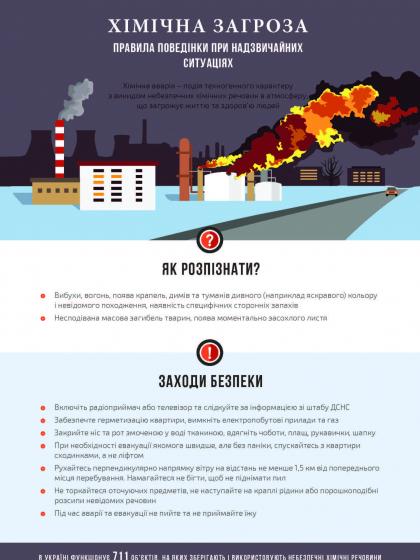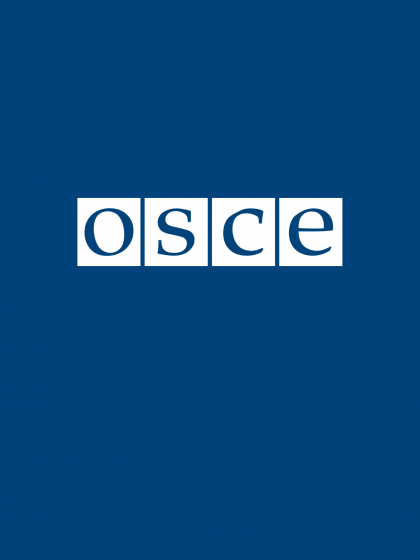Publications
Mercury. Safety Rules in Emergencies
Publishing date: 15 April 2022
Collections: Chemical Threats: Safety Basics - Print Materials
Content type: Factsheet
Where we are: OSCE Project Co-ordinator in Ukraine (closed)
What we do: Environmental activities
Publisher: Organization for Security and Co-operation in Europe
Mercury is widely used in medicine, electrical appliances and metallurgy. However, mercury vapor is extremely harmful to all life forms.
Ammonia. Safety Rules in Emergencies
Publishing date: 15 April 2022
Collections: Chemical Threats: Safety Basics - Print Materials
Content type: Factsheet
Where we are: OSCE Project Co-ordinator in Ukraine (closed)
What we do: Disaster risk reduction, Environmental activities
Publisher: Organization for Security and Co-operation in Europe
Ammonia is one of the most frequently used agents in the modern chemical industry, it can be used to produce fertilizers, but also you can find it in facilities where there’s a need to store significant amounts of refrigerated food. In case of a spillage, it poses a significant threat to human health and life.
Chemical Incidents. Leaflet on Risks and Safety Measures
Publishing date: 15 April 2022
Collections: Chemical Threats: Safety Basics - Print Materials
Content type: Factsheet
Where we are: OSCE Project Co-ordinator in Ukraine (closed)
What we do: Environmental activities
Publisher: Organization for Security and Co-operation in Europe
The concept of countering chemical threats is highly relevant for Ukraine, which has a large number of high-risk chemical facilities. Potential risks are significantly higher today, when plants, enterprises and storehouses can be targeted or even accidentally damaged during hostilities. A resulting spillage (release) of hazardous chemicals poses a threat to human health, life, and to the environment. This leaflet produced by the OSCE projects in Ukraine provides a number of practical tips that will help civilians to recognize chemical threat, take safety measures and provide first aid in case of poisoning.
Quality Specialist Support Services for Hate Crime Victims: Training Course
Publishing date: 5 April 2022
Content type: Guide / manual / handbook
Where we are: OSCE Office for Democratic Institutions and Human Rights
Publisher: Organization for Security and Co-operation in Europe
Hate crime is a manifestation of discrimination and intolerance that has a profound impact on victims, communities and societies. Victims of hate crimes require specialist services to support them in their recovery from these crimes, to enable them to effectively participate in the criminal justice process and to regain a sense of agency. This support includes practical help, emotional and psychosocial support, and advice relating to legal and financial issues, as well as community work. Such specialist support is tailored specifically to each individual who is a victim of or a witness to a hate crime, has experienced a hate incident or is affected by a hate crime committed against someone else.
Democracy and Human Rights in the OSCE: The ODIHR Annual Report 2021
Publishing date: 23 March 2022
Collections: ODIHR Annual Reports
Content type: Annual report
Where we are: OSCE Office for Democratic Institutions and Human Rights
Publisher: Organization for Security and Co-operation in Europe
This report highlights the impact of activities carried out by the OSCE Office for Democratic Institutions and Human Rights (ODIHR) in 2021, the year that marked the Office’s 30th anniversary.
Guidebook for Local Ombudspersons
Publishing date: 30 March 2022
Content type: Guide / manual / handbook
Where we are: OSCE Mission to Serbia
What we do: Good governance
Publisher: Organization for Security and Co-operation in Europe
The publication is aimed at helping ombudspersons to use effective and credible approaches in their everyday work, in promoting fairness, equality, clarity and innovation, as well as in protection of human rights. It offers recommendations to ombudspersons in their efforts to ensure that their institution is well regarded within the local and peer communities, such as the Association of Ombudspersons in Serbia, but also within other independent institutions in the country, as well as other regional and international independent institutions and organizations they co-operate with. Due to the important oversight role of ombudspersons, as independent institutions, the OSCE Mission to Serbia supports the Association of Ombudspersons in Serbia (AOS) in its efforts to help local ombudspersons in fulfilling their mandate of setting the standards in the work of democratic institutions and through continuous protection of the rights of citizens. The publication is available in Serbian language.
Policy responses to technology-facilitated trafficking in human beings: Analysis of current approaches and considerations for moving forward
Publishing date: 17 March 2022
Content type: Study / report
Where we are: Office of the Special Representative and Co-ordinator for Combating Trafficking in Human Beings
What we do: Combating trafficking in human beings
Publisher: Organization for Security and Co-operation in Europe
The report provides an analysis of how technology-facilitated trafficking in human beings has been approached from the perspective of policy and legislation across the OSCE participating States. While looking primarily at the accelerating shift toward government-led responses, the report also examines the policies and practices adopted by the private sector and civil society organizations. In addition, the report offers recommendations for policy and legislative responses by OSCE participating States to the misuse of technology to exploit victims.
Compendium: Practices of Civil Society and Government Collaboration for Effective Hate Crime Victim Support
Publishing date: 18 March 2022
Content type: Guide / manual / handbook
Where we are: OSCE Office for Democratic Institutions and Human Rights
What we do: Tolerance and non-discrimination
Publisher: Organization for Security and Co-operation in Europe
This Compendium has been created by the the OSCE Office for Democratic Institutions and Human Rights (ODIHR), in partnership with the Association of Counselling Centers for Victims of Right-Wing, Racist and Antisemitic Violence in Germany (VBRG).
Policy responses to technology-facilitated trafficking in human beings: Analysis of current approaches and considerations for moving forward
Publishing date: 16 March 2022
Content type: Study / report
Where we are: Office of the Special Representative and Co-ordinator for Combating Trafficking in Human Beings
What we do: Combating trafficking in human beings
Publisher: Organization for Security and Co-operation in Europe
The report provides an analysis of how technology-facilitated trafficking in human beings has been approached from the perspective of policy and legislation across the OSCE participating States. While looking primarily at the accelerating shift toward government-led responses, the report also examines the policies and practices adopted by the private sector and civil society organizations. In addition, the report offers recommendations for policy and legislative responses by OSCE participating States to the misuse of technology to exploit victims.
Research study on Position of Women in Trade Unions in Serbia
Publishing date: 7 March 2022
Content type: Book
Where we are: OSCE Mission to Serbia
What we do: Gender equality
Publisher: Organization for Security and Co-operation in Europe
Research Study Position of Women in Trade Unions in Serbia prepared by CSO Women Association FemPlatz, in 2020, with the OSCE Mission's support. According to the Research, there are still existent gaps in the living standards and in the well-being of men and women in Serbia. Gender inequalities at labor market exist in different important aspects, such as segregation in occupation and employment sectors, existence of glass ceilings, and, in addition, it shows, that, although women workers have played a key role during COVID-19 epidemic, they have been more exposed to economic consequences of the epidemic than men. Research also highlights the need to address serious representation gaps in trade unions, especially at leadership positions, as well as the need to review and adapt policies in order to genuinely serve men and women alike, underlining the fact that gender equality is an important union matter. It contains recommendations for a gender-responsive approach in economic area in order to avoid further reproducing or accentuating of economic and gender inequalities and in order to improve future approach in use of women’s resources.










